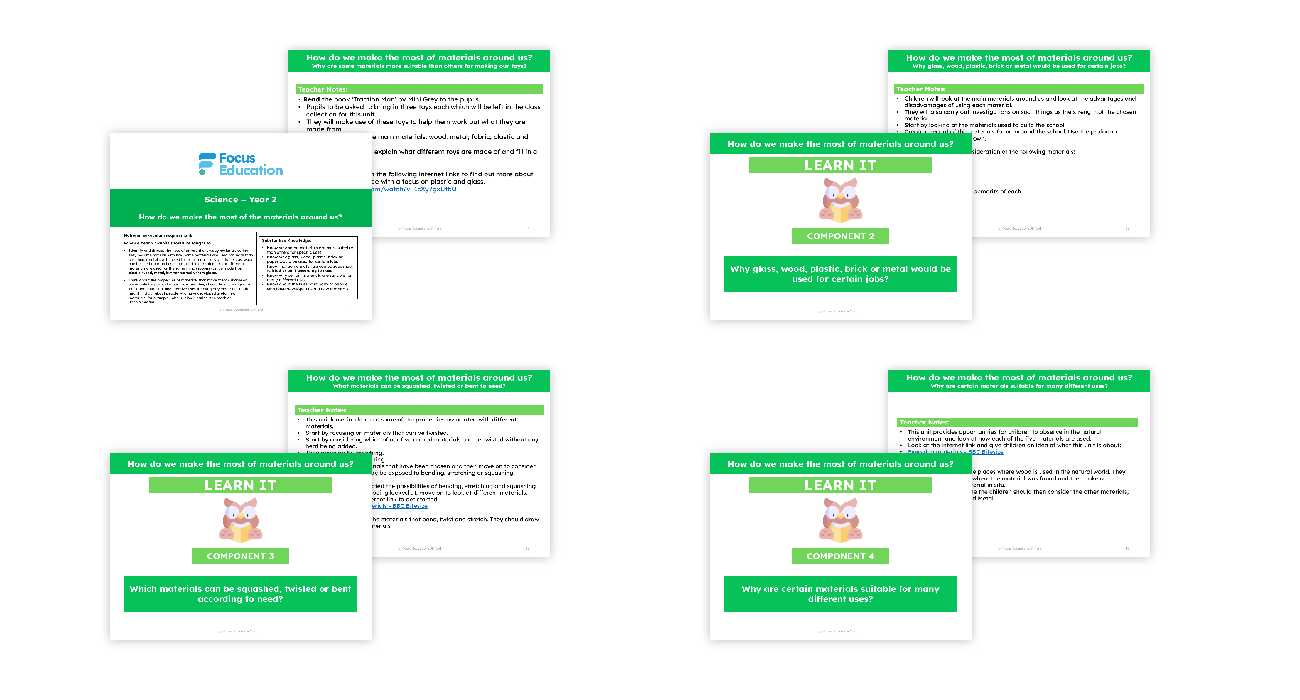Materials
Unit
Science
Year 2
Focus Education
Science Unit Description
Editable presentation
Group work
Active
Discussion based learning
Year 2 Science unit, Materials from Focus Education. This unit uses an enquiry-approach methodology, lessons are built around a central question in order to build pupil curiosity and motivate learning. Materials has been constructed in accordance with the National Curriculum.
Unit contents
Resources
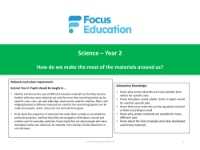
Long-term overview - Materials - Year 2
Resource
Science
Y2
The Long-term overview for the unit Materials from Focus Education
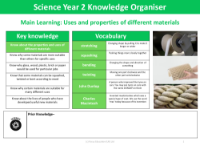
Knowledge organiser - Materials - Year 2
Resource
Science
Y2
The Knowledge organiser for the unit Materials from Focus Education
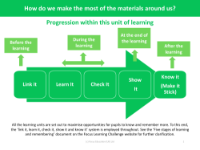
Progression pedagogy - Materials - Year 2
Resource
Science
Y2
The Progression pedagogy for the unit Materials from Focus Education
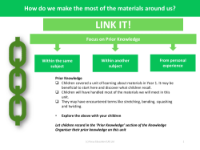
Link it! Prior knowledge - Materials - Year 2
Resource
Science
Y2
Link it! Prior knowledge is the set of initial activities that should be used to introduce the unit Materials from Focus Education, it will allow pupils to link the upcoming learning to their existing skills and knowledge
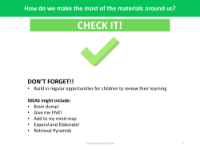
Check it! - Materials - Year 2
Resource
Science
Y2
Check it! is a set of assessment for learning tasks and assessments that should be used to check pupils' understanding of the learning during the course of the unit Materials from Focus Education.
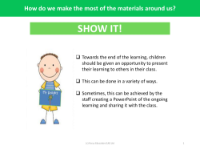
Show it! Group presentation - Materials - Year 2
Resource
Science
Y2
Show it! Group presentation is a group task that should be used to solidify student learning and should be run after the teaching of the lessons contained in the unit Materials from Focus Education
Lessons
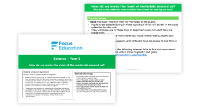
1. Why are some materials more suitable than others for making our toys?
Lesson
Science
Y2
Year 2 Science lesson from the unit Materials. This lesson uses an enquiry-approach method, and will facilitate students answering the question 'Why are some materials more suitable than others for making our toys? '
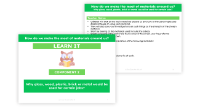
2. Why glass, wood, plastic, brick or metal would be used for certain jobs
Lesson
Science
Y2
Year 2 Science lesson from the unit Materials. This lesson uses an enquiry-approach method, and will facilitate students answering the question 'Why glass, wood, plastic, brick or metal would be used for certain jobs'
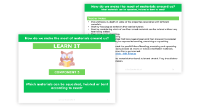
3. Which materials can be squashed, twisted or bent according to need?
Lesson
Science
Y2
Year 2 Science lesson from the unit Materials. This lesson uses an enquiry-approach method, and will facilitate students answering the question 'Which materials can be squashed, twisted or bent according to need?'
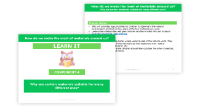
4. Why are certain materials suitable for many different uses?
Lesson
Science
Y2
Year 2 Science lesson from the unit Materials. This lesson uses an enquiry-approach method, and will facilitate students answering the question 'Why are certain materials suitable for many different uses?'
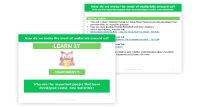
5. Who are the important people that have developed useful, new materials?
Lesson
Science
Y2
Year 2 Science lesson from the unit Materials. This lesson uses an enquiry-approach method, and will facilitate students answering the question 'Who are the important people that have developed useful, new materials?'
Assessment for Learning Resources
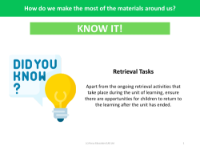
Know it!
Resource
Science
Y2
'Know it! - Materials - Year 2' is a resource for assessing pupil knowledge at the end of the Year 2 unit, Materials
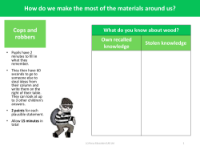
Cops and robbers - What do you know about wood?
Resource
Science
Y2
'Cops and robbers - What do you know about wood?' is a resource for assessing pupil knowledge at the end of the Year 2 unit, Materials
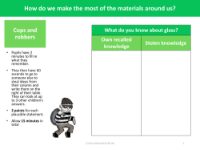
Cops and robbers - What do you know about glass?
Resource
Science
Y2
'Cops and robbers - What do you know about glass?' is a resource for assessing pupil knowledge at the end of the Year 2 unit, Materials
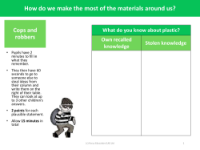
Cops and robbers - What do you know about plastic
Resource
Science
Y2
'Cops and robbers - What do you know about plastic' is a resource for assessing pupil knowledge at the end of the Year 2 unit, Materials
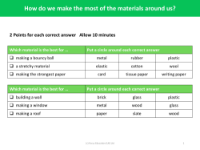
Mini quiz - What material is best for…?
Resource
Science
Y2
'Mini quiz - What material is best for…?' is a resource for assessing pupil knowledge at the end of the Year 2 unit, Materials
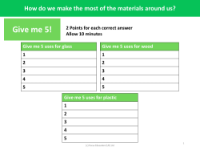
Give me 5 - Uses for each material
Resource
Science
Y2
'Give me 5 - Uses for each material' is a resource for assessing pupil knowledge at the end of the Year 2 unit, Materials
Unit contents
Resources

Long-term overview - Materials - Year 2
Resource
Science
Y2
The Long-term overview for the unit Materials from Focus Education

Knowledge organiser - Materials - Year 2
Resource
Science
Y2
The Knowledge organiser for the unit Materials from Focus Education

Progression pedagogy - Materials - Year 2
Resource
Science
Y2
The Progression pedagogy for the unit Materials from Focus Education

Link it! Prior knowledge - Materials - Year 2
Resource
Science
Y2
Link it! Prior knowledge is the set of initial activities that should be used to introduce the unit Materials from Focus Education, it will allow pupils to link the upcoming learning to their existing skills and knowledge

Check it! - Materials - Year 2
Resource
Science
Y2
Check it! is a set of assessment for learning tasks and assessments that should be used to check pupils' understanding of the learning during the course of the unit Materials from Focus Education.

Show it! Group presentation - Materials - Year 2
Resource
Science
Y2
Show it! Group presentation is a group task that should be used to solidify student learning and should be run after the teaching of the lessons contained in the unit Materials from Focus Education
Lessons

1. Why are some materials more suitable than others for making our toys?
Lesson
Science
Y2
Year 2 Science lesson from the unit Materials. This lesson uses an enquiry-approach method, and will facilitate students answering the question 'Why are some materials more suitable than others for making our toys? '

2. Why glass, wood, plastic, brick or metal would be used for certain jobs
Lesson
Science
Y2
Year 2 Science lesson from the unit Materials. This lesson uses an enquiry-approach method, and will facilitate students answering the question 'Why glass, wood, plastic, brick or metal would be used for certain jobs'

3. Which materials can be squashed, twisted or bent according to need?
Lesson
Science
Y2
Year 2 Science lesson from the unit Materials. This lesson uses an enquiry-approach method, and will facilitate students answering the question 'Which materials can be squashed, twisted or bent according to need?'

4. Why are certain materials suitable for many different uses?
Lesson
Science
Y2
Year 2 Science lesson from the unit Materials. This lesson uses an enquiry-approach method, and will facilitate students answering the question 'Why are certain materials suitable for many different uses?'

5. Who are the important people that have developed useful, new materials?
Lesson
Science
Y2
Year 2 Science lesson from the unit Materials. This lesson uses an enquiry-approach method, and will facilitate students answering the question 'Who are the important people that have developed useful, new materials?'
Assessment for Learning Resources

Know it!
Resource
Science
Y2
'Know it! - Materials - Year 2' is a resource for assessing pupil knowledge at the end of the Year 2 unit, Materials

Cops and robbers - What do you know about wood?
Resource
Science
Y2
'Cops and robbers - What do you know about wood?' is a resource for assessing pupil knowledge at the end of the Year 2 unit, Materials

Cops and robbers - What do you know about glass?
Resource
Science
Y2
'Cops and robbers - What do you know about glass?' is a resource for assessing pupil knowledge at the end of the Year 2 unit, Materials

Cops and robbers - What do you know about plastic
Resource
Science
Y2
'Cops and robbers - What do you know about plastic' is a resource for assessing pupil knowledge at the end of the Year 2 unit, Materials

Mini quiz - What material is best for…?
Resource
Science
Y2
'Mini quiz - What material is best for…?' is a resource for assessing pupil knowledge at the end of the Year 2 unit, Materials

Give me 5 - Uses for each material
Resource
Science
Y2
'Give me 5 - Uses for each material' is a resource for assessing pupil knowledge at the end of the Year 2 unit, Materials
Unlimited access to 30,000+ resources
All subjects
National Curriculum Coverage
Award-winning content
This website uses cookies to enhance the user experience.
To get more information about these cookies check our
Hey! It looks like you're in the United States.
Stay on the UK site
Switch to the US site

